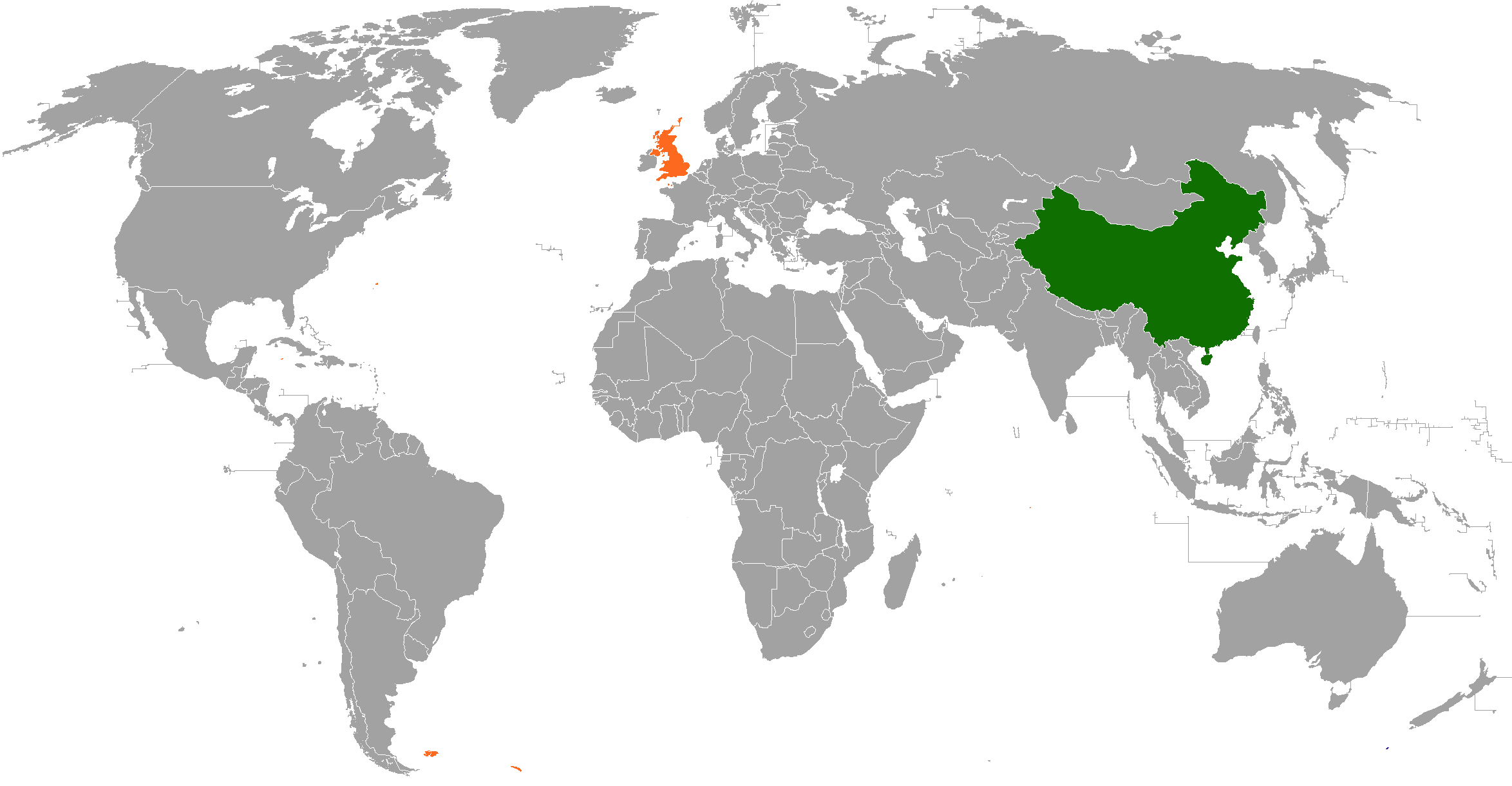
China–United Kingdom relations
Chinese-United Kingdom relations (simplified Chinese: 中英关系; traditional Chinese: 中英關係; pinyin: Zhōng-Yīng guānxì), more commonly known as British–Chinese relations, Anglo-Chinese relations and Sino-British relations, are the interstate relations between China (with its various governments through history) and the United Kingdom.
This article is about relations with China especially since 1949. For relations between the Republic of China and the United Kingdom, see Taiwan–United Kingdom relations.Relations between the two nations have gone through ups and downs over the course of the late 20th and early 21st centuries. The UK and China were on opposing sides during the Cold War, and relations were strained during the period Hong Kong was a British territory.[1][2] Following the conclusion of the Cold War and the completion of an agreement regarding Hong Kong's future, a period known as the "Golden Era" of Sino-British relations began with multiple high-level state visits and bilateral trade and military agreements.[3][4] This roughly 20-year period came to an abrupt end during the 2019–2020 Hong Kong democracy protests and the imposition of a highly controversial national security law that quelled civil liberties and freedoms in the city, which was viewed in the UK as a serious breach of the Sino-British Joint Declaration.[5][6] In the years following relations have deteriorated significantly, with the UK banning Chinese companies from its 5G network development, participating in Anglo-American military operations in the South China Sea to counter Chinese territorial claims, and sanctioning China for alleged human rights abuses and crimes against humanity in Xinjiang.[7][8][9][10][11][12][13] However, despite this, the countries maintain close economic relations,[14] with China being UK's third-largest trading partner as of 2022.[15]
Transport[edit]
Air Transport[edit]
All three major Chinese airlines, Air China, China Eastern & China Southern fly between the UK and China, principally between London-Heathrow and the three major air hubs of Beijing, Shanghai and Guangzhou. China Southern also flies between Heathrow and Wuhan. Among China's other airlines; Hainan Airlines flies between Manchester and Beijing, Beijing Capital Airlines offers Heathrow to Qingdao, while Tianjin Airlines offers flights between Tianjin, Chongqing and Xi'an to London-Gatwick. Hong Kong's flag carrier Cathay Pacific also flies between Hong Kong to Heathrow, Gatwick and Manchester. The British flag carrier British Airways flies to just three destinations in China; Beijing, Shanghai and Hong Kong, and in the past Chengdu. Rival Virgin Atlantic flies between Heathrow to Shanghai and Hong Kong. British Airways has mentioned that it is interested in leasing China's new Comac C919 in its pool of aircraft of Boeing and Airbus.[75]
Rail Transport[edit]
In January 2017, China Railways and DB Cargo launched the Yiwu-London Railway Line connecting the city of Yiwu and the London borough of Barking, and creating the longest railway freight line in the world. Hong Kong's MTR runs the London's TfL Rail service and has a 30% stake in South Western Railway. In 2017, train manufacturer CRRC won a contract to build 71 engineering wagons for London Underground. This is the first time a Chinese manufacturer has won a railway contract.[76]
Press[edit]
The weekly-published Europe edition of China Daily is available in a few newsagents in the UK, and on occasions a condensed version called China Watch is published in the Daily Telegraph.[77] The monthly NewsChina,[78] the North American English-language edition of China Newsweek (中国新闻周刊) is available in a few branches of WHSmith. Due to local censorship, British newspapers and magazines are not widely available in mainland China, however the Economist and Financial Times are available in Hong Kong.
British "China Hands" like Carrie Gracie, Isabel Hilton and Martin Jacques occasionally write opinion pieces in many British newspapers and political magazines about China, often to try and explain about Middle Kingdom.
Radio and television[edit]
Like the press, China has a limited scope in the broadcasting arena. In radio, the international broadcaster China Radio International broadcasts in English over shortwave which isn't widely taken up and also on the internet. The BBC World Service is available in China by shortwave as well, although it is often jammed (See Radio jamming in China). In Hong Kong, the BBC World Service is relayed for eight hours overnight on RTHK Radio 4 which on a domestic FM broadcast.
On television, China broadcasts both its two main English-language news channels CGTN and CNC World. CGTN is available as a streaming channel on Freeview, while both are available on Sky satellite TV and IPTV channels. Mandarin-speaking Phoenix CNE TV is also available of Sky satellite TV. Other TV channels such as CCTV-4, CCTV-13, CGTN Documentary and TVB Europe are available as IPTV channels using set-top boxes.
British television isn't available in China at all, as foreign televisions channels and networks are not allowed to be broadcast in China. On the other hand, there is an interest in British television shows such as Sherlock and British television formats like Britain's Got Talent (China's Got Talent (中国达人秀)) and Pop Idol (Super Girl (超级女声)).